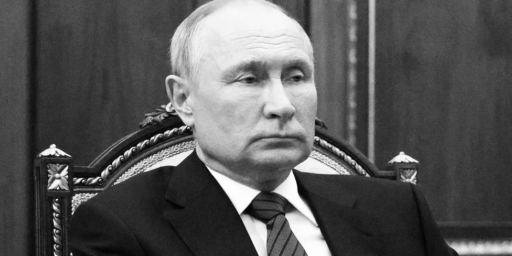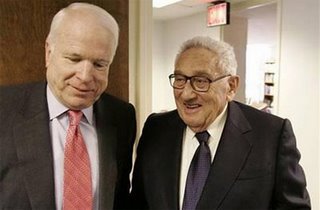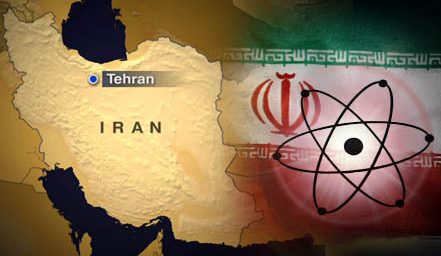FLETCHER CONFERENCE REPORT
The first day of this year’s 34th Annual Institute for Foreign Policy Analysis (of the Tufts University’s Fletcher School) Conference was pretty informative as these things go. The theme is Security Planning and Military Transformation After Iraqi Freedom. The audience is almost entirely high-ranking officers from the US and allies, fairly senior academics, and various contractors, analysts, and others professionally involved with the security studies business. The US Navy was an official co-sponsor this year, so high ranking naval officers were in especial abundance.
My general observation, having gone to a lot of these sort of things, is that one usually gets very good insights from ground-level practitioners (diplomats, officers below the grade of colonel, congressional staffers, and the like) and from very high-level decisionmakers (presidents, cabinet secretaries, 4-star flag officers, etc.) but anything uttered by a non-4 star general officer, ambassador, undersecretary, or non-leadership congressman is likely to be exceedingly uninteresting. The best one can hope for from the last group is that they will say nothing in a humorous and charming manner. This has held true so far with this event.
The opening session this morning was an example of this phenomenon. The first speaker was Andrew Hoehn, Deputy Assistant SecDef for Strategy. He seemed quite competent but didn’t say anything everyone in the audience didn’t already know. He spoke in great generalities about a little bit of everything.
Robert Kaplan, correspondent for Atlantic Monthly, had a lot of interesting comments about global terrorism. He contends we’re in the midst of a global insurgency, including Iraq, Afghanistan, Pakistan, the Philippines, anc Colombia most prominently. He thinks we’re doing a bad job of fighting it because we’re used to a gigantic hierarchical model of warfighting and we instead need to flatten the structure and let those at batallion level and below–preferably NCOs–on the ground make most of the decisions with only very broad guidance. He contends that the “more troops” calls in Iraq and Afghanistan are exactly the wrong thing to do; He thinks special operators can be used as force multipliers, with as few as 10-20 soldiers going into many of the problem countries, training the “indigs,” and working behind the scenes to make things better.
Mansoor Ijaz, in addition to the maritime issues referenced in the previous post, made the observation that al Qaeda is the equivalent of a computer virus overlay, providing support, instruction capacity, etc. to various cells–including those in other major terrorist organizations that we think of as distinct. He contends that there is a global terrorist enterprise that is Islamist and that all share a single goal–equalizing the world economy by bringing the West down. He listed three types of terrorist threats: Nuisance terror, which takes little time to plan (under 2 months) and which is designed primarily to keep us tired and our resources spread; Symbolic terror, such as the 9/11 attacks, whcih take 1-2 years to plan and which hit emotionally significant targets; and Structural terrorism, taking 5 or more years to plan, and that aim at the major infrastructure of the global economy. The maritime choke points are but one such example.
Paul Bracken of Yale drew some interesting parallels between the security and economic milieus, focusing mainly on his Second Nuclear Age meme that he introduced a few years ago. Much of the talk was about deterence and game theory, subjects that I don’t find all that interesting.
Hans Binnendijk, a former senior DOD official in the Clinton Administration now at National Defense University, and author of Transforming America’s Military, gave a very interesting talk on defense transformation as required for reconstruction and stabilization operations, such as those now underway in Afghanistan and Iraq. Much of it is too esoteric to be of much interest to anyone other than those–like myself–who actually study defense bureaucracy. One of the things he brought up was creating two R&S divisions–one active, one reserve–designed precisely for that mission and heavy on MPs, psyops, civil affairs, medical, and engineering assets. I agree with the need for these things in greater supply, although I don’t think creating separate divisions works for it because missions are too fluid–R&S becomes combat again very quickly. A PDF of the paper behind his talk is available online.
All agreed that we are woefully under-equipped with people with the ability to speak “exotic” languages like Urdu, Pashtun, Tagalog, Farsi, and other important Middle Eastern languages.
The luncheon speaker was John Bolton, Undersecretary of State for Arms Control and International Security, who is a very controversial and interesting figure. His speech was, true to the maxim above, neither. He basically parotted administration platitudes and said nothing anyone in the room–or, indeed, reading this blog–didn’t already know.
The afternoon panel was on “the new strategic triad,” basically how nuclear strategy has evolved since the fall of the USSR. It’s not a topic I’ve ever found particularly interesting since, as far as I can determine, there’s precious little we can do about nuclear proliferation other than wring our hands about what a bad thing it is. That’s especially unexciting right after a heavy lunch.
Tomorrow’s session will feature the Director of the Office of Force Transformation, the Army Chief of Staff, the Chief of Naval Operations, the Marine Commandant, the Vice Commandant of the Coast Guard, and the Deputy Chief of Staff for Plans and Programs of the Air Force. GEN Richard Meyers, Chairman of the JCS, will be the luncheon speaker. I’ll report on that tomorrow evening should anything interesting come out of it.






Cool insight James.
thanks